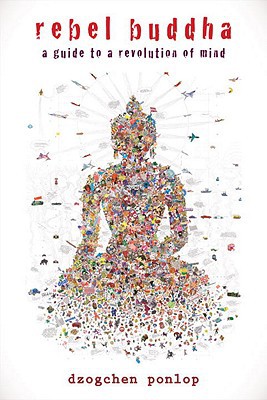Dzogchen Ponlop is a widely celebrated teacher known for his ability to convey Buddhist wisdom and practices to modern minds. He is also a poet, visual artist, and city-dweller. Dzogchen Ponlop is the founder and principal teacher of Nalandabodhi, a network of Buddhist practice centers. This cogent and fresh presentation of Buddhist basics has been constructed from two lecture series on dharma and culture given in 1999 and 2008. The title of the book is explained by the following:
"Rebel buddha is the renegade that gets you to switch your allegiance from sleep to the awakened state. This means you have the power to wake up your dreaming self, the imposter that is pretending to be the real you. You have the means to break loose from whatever binds you to suffering and locks you in confusion. You are the champion of your own freedom. Ultimately, the mission of rebel buddha is to instigate a revolution of mind."
With freedom as our home ground, we are able to ask all the difficult questions, to examine the truth on our own terms, and to get to know our minds. But we are also doing the basic training of our whole being — body, speech, and mind. Dzogchen Ponlop is convinced that mindfulness is "our greatest friend and ally on the spiritual path. It's the calling card of rebel buddha." This practice brings steadiness, calmness, and clarity to our over-active minds. Another dimension of our waking up is dealing with our anger and aggression as a means of softening our hearts through acts of compassion. Our rebel buddha also gets a workout when we practice what the author calls "transcendent generosity" which is "a willingness to be open and do whatever is necessary in the moment, without any philosophical or religious rationale." A final activity for our rebel buddha is to throw out our cultural cushions which include duality. Instead we should make sure that we adhere to the Buddha's Four Reliances:
• "Rely on the teaching, not the person.
• Rely on the meaning, not the words.
• Rely on the definitive meaning, not the provisional meaning.
• Rely on wisdom, not on consciousness."
